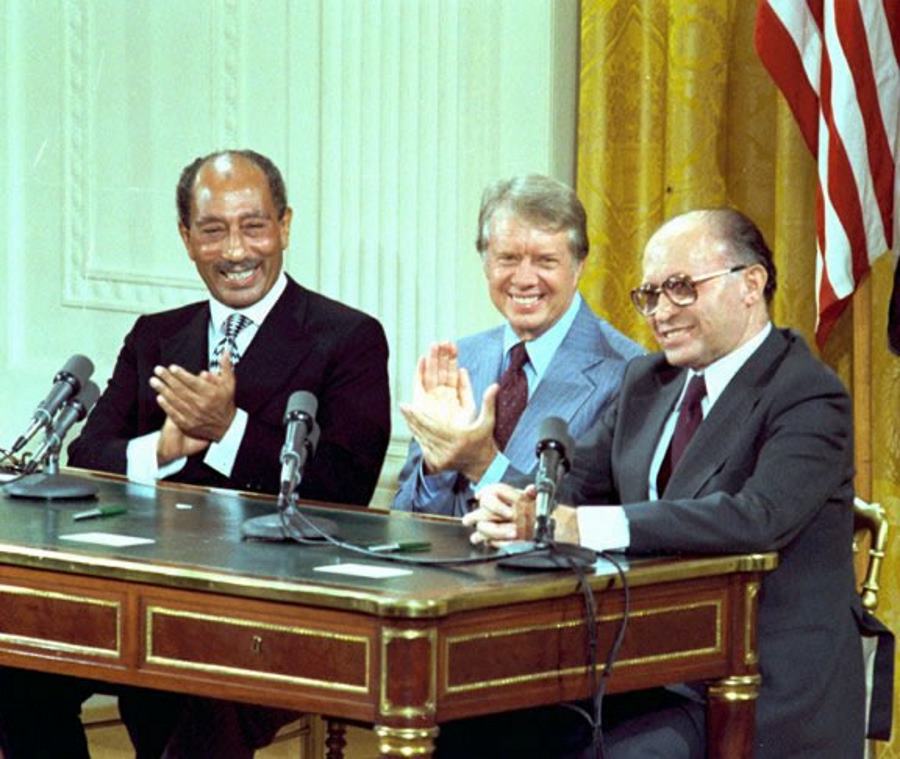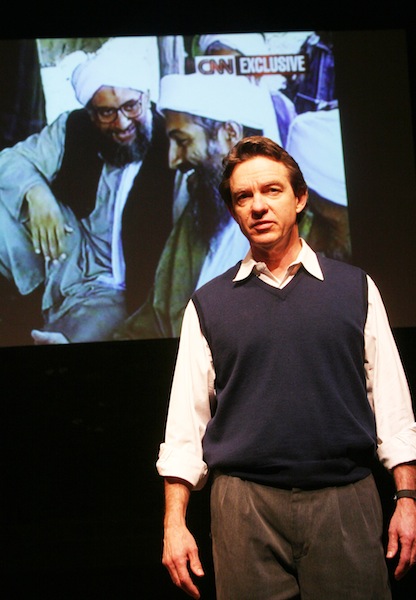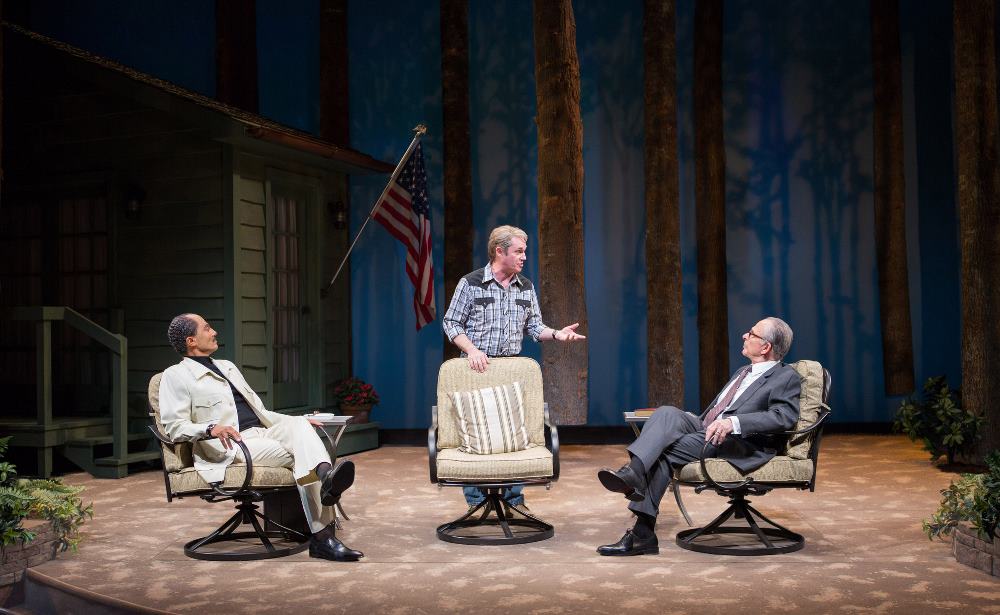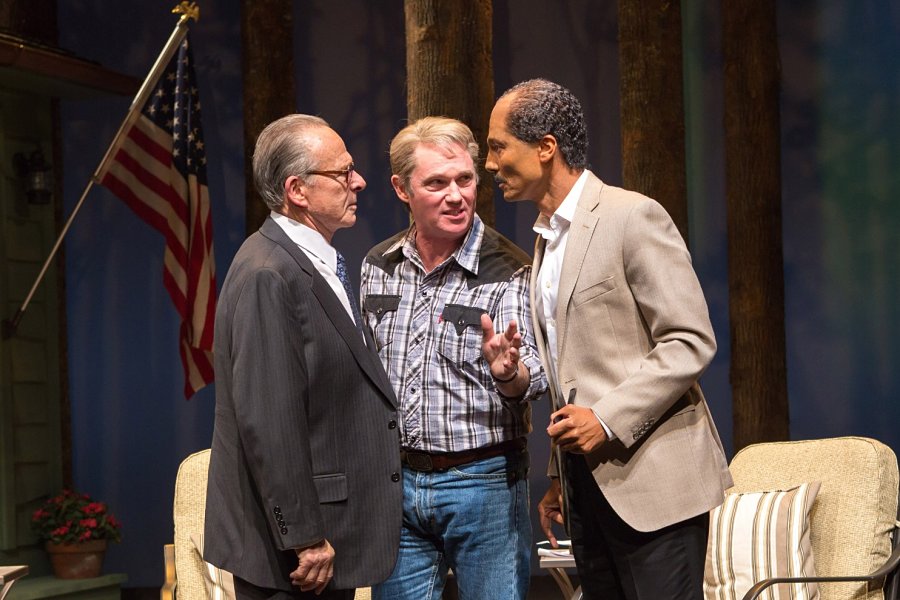For nearly 50 years now, peace in the Middle East has been either a stated or implicit goal of American foreign policy. Every president since LBJ has tried to achieve it, with varying results. Only one of them, Jimmy Carter, actually brokered a lasting treaty between Israel and an Arab neighbor. The Camp David Accords were signed at the White House on Sept. 17, 1978, by Israel’s prime minister, Menachem Begin, and Egypt’s president, Anwar Sadat. Though the treaty encountered some vehement backlash—Sadat was assassinated by Jihadists in 1981—and militant activity has at times roiled the border, the relationship between Israel and Egypt’s governments has remained peaceful for 36 years, a significant feat that is too easily taken for granted.
“There are no perfect partners for peace,” says Lawrence Wright, whose new play Camp David opens at Arena Stage in Washington, D.C., on April 3. “These three men were just as intransigent and oppositional as our leaders are these days, and yet peace was accomplished. It was Carter’s personal drive that brought it to a climax.”
You may know Wright as the New Yorker staff writer who wrote The Looming Tower, a history of Al-Qaeda that won the Pulitzer Prize in 2007, or Going Clear, the 2013 best-selling exposé on Scientology. You may not know, unless you’re a theatregoer in a few major cities, that Wright has been building an acclaimed side career as a dramatist and performer. He’s based much of his stage work directly on his journalism: My Trip to Al-Qaeda, a solo show that he wrote and performed at New York’s Culture Project and at the Kennedy Center in D.C., was based on The Looming Tower; and The Human Scale, a solo work produced by New York’s Public Theater at 3LD Art and Technology Center, was based on a New Yorker piece he wrote about the crisis in Gaza.
Camp David marks a new challenge for Wright. The script is not based on any of his previous reporting, and for the first time he has written a play in which every character is an historical figure. The idea of producing a show about the Camp David agreements originally came from Gerald Rafshoon, director of communications under President Carter, who was present at the accords and has been trying for decades to find a way to tell the story behind the landmark event. Undecided in what venue to produce it and whom to enlist as a writer, Rafshoon discussed the idea with Rocco Landesman, longtime Broadway producer and former NEA chairman. Ever the matchmaker, Landesman recommended Wright and brought the idea personally to Molly Smith, artistic director of Arena Stage.
It proved a fortuitous connection. Last year the theatre launched its American Presidents Project to present plays that illuminate “an American president or their families,” as Smith puts it. (The inaugural production was Mary T. and Lizzy K., about Mary Todd Lincoln and her seamstress, a former slave, written and directed by Tazewell Thompson.) With its emphasis on President Carter, played by Richard Thomas, and his wife Rosalynn, played by Hallie Foote, Camp David certainly fits that bill, though the play is nearly as much about two other heads of state—Begin, played by Ron Rifkin, and Sadat, played by Khaled Nabawy. Indeed, what struck Smith, who directs Camp David, is the way the three leaders evolved through the talks; they started out wary and hostile but ultimately found their way to a shared desire for progress.
“Here are leaders who were willing to put down their careers, roll up their sleeves, and sit down human being to human being,” she says. “I don’t think we see that down the street at the Capitol.”
Wright, who lived and taught in Egypt in the late 1960s and has been working as a reporter ever since, delved into the subject matter of Camp David like a journalist on assignment. He traveled to the Middle East to interview Israeli and Egyptian officials who were present at the Accords. He also traveled to Plains, Ga., to spend time with Carter and his wife. He pored over documents in the Carter Library and read through Mrs. Carter’s diary from Camp David, which the former First Lady agreed to share.

To understand the significance of the Camp David Accords, a little scene-setting is in order. Eleven years earlier, Israel had decimated the neighboring militaries in Egypt, Jordan and Syria in the Six-Day War of 1967 and annexed the Sinai Peninsula in northern Egypt. It was a crushing defeat for Egypt, the most powerful and influential of these Arab countries, and a great victory for Israel, then not even 20 years old. The two countries’ mutual enmity mounted in ensuing years and subsequent wars. Carter felt compelled to do something about that, and made Middle East peace a cornerstone of his campaign for president in 1976. When President Sadat visited Jerusalem as a peacemaking gesture the following year, stunning Egyptians and Israelis alike, Carter felt emboldened to propose direct talks.
Wright attributes Carter’s strength of purpose, and his success in creating a connection with his Jewish and Muslim counterparts, to his devout Christian faith. The peace treaty “was three religious men trying to solve a problem that religion had caused in the first place,” he says.

The idea of merging journalism and theatre first took shape in Wright’s mind when he saw Fires in the Mirror, created and performed by Anna Deavere Smith at the Public Theater in 1992. “I didn’t know that could be done,” he recalls. “She interviewed all these people who were involved in the Crown Heights tragedy [a conflagration between Orthodox Jews and African-Americans in Brooklyn], and then enacted them. I was electrified by that, and I thought: ‘There’s something there for me.’ ”
Wright had actually tried his hand at playwriting before—titles from the ’80s include Cracker Jack and Sonny’s Last Stand—but he admits he didn’t have a strong grasp of the craft in those years. His first major theatrical work, My Trip to Al-Qaeda, was journo-theatre, in which he narrated the story onstage with projections behind him. He did much the same with The Human Scale. But for Fallaci, a semi-fictional play about the fearlessly provocative Italian journalist Oriana Fallaci staged at Berkeley Repertory Theatre, Wright wrote a proper play; he wasn’t onstage at all. Instead, Concetta Tomei played the title role, in dialogue with a fictional young reporter.
If those three plays have a common link, it is that each follows a journalist’s quest for answers; though Wright wasn’t onstage for Fallaci, the role of the reporter was in many ways his stand-in. Camp David, by contrast,has no such intermediary figure to lead the audience into the world of the play. “For me, it was a big deal to take that figure out,” Wright concedes. “The journalist had been my entry into the narrative.” The only person in Camp David who is “to some extent the audience’s representative is Rosalynn Carter. Her job is to make peace among the peacemakers.”
Oskar Eustis, who directed The Human Scale and Fallaci, knew that a veteran reporter like Wright would be able to authentically depict real-life figures. The challenge, Eustis noted, was “to find what was central to the dramatic journey. Larry is a brilliant journalist and had done a superb job accumulating the facts, but when you put [a real person] in a play, you’re making a claim that you’re going to uncover a deeper truth. You’re going to find something underneath the facts that lets us say, ‘Now I have an insight not just into this human being, but into all human beings.’”
Historical fiction—whether in novels like Hilary Mantel’s Wolf Hall, films like Tony Kushner’s Lincoln, or plays like Camp David—relies in part on the notion that a writer’s knowledge of the subject can free their imagination to discover an essential dramatic or narrative truth. And Camp David joins a particular circle of historical stage dramas, including Stuff Happens and All the Way, that portray relatively recent real events with a mix of dialogue that is partly on the record and partly imagined.
“There’s no way any of us could know what these private conversations were like,” Smith points out. “That’s where Larry takes all of the information that he is privileged to know and twines it with his artistic self.” The result, she adds, is “fiction and nonfiction at the same time.”
For Wright, who says he’s “wedded to the idea that reality is more interesting than fantasy,” playwriting begins in the same way as his reporting: He gathers information like a “graduate student” and relies heavily on details he garners from interviews. In fact, his skill as an interviewer may be part of what makes him a facile playwright. “As a reporter, he’s able to get people to talk about their experiences, synthesize it, and gets to the dramatic core,” Rafshoon observes.

Because the history preceding the Camp David Accords significantly impacts the play’s events, Smith felt strongly about giving the audience context. The set, which portrays the wooded grounds of the Presidential country residence in Catoctin Mountain Park in Maryland, features video screens against its back wall. As the play begins, projected images depict wars leading up to 1978, and maps show how the nations’ borders were redrawn over the years.
“And at the end of the play,” Smith says, “I want to take us from ’78 all the way through now. The assassination [of Sadat], how Begin died, the Nobel Peace Prize [awarded to Sadat and Begin together], how Carter won it later, where President and Mrs. Carter are living now.”
What this last series of images also conveys is that, despite the success of the accords, none of the leaders involved experienced a great political windfall as a result. Instead, Wright notes, “Each suffered in some way.” The most extreme case was Sadat, gunned down in Cairo by the Egyptian Islamic Jihad. In Israel, Begin encountered political pushback following his expansion of settlements in the West Bank and his invasion of Lebanon in the years after the accords. Soon after, he withdrew from politics entirely.
And Carter grew to be seen by many as a failed president, as much due to a troubled economy as to his foreign policy, including his handling of the Iranian hostage crisis. He lost the 1980 election in a landslide to Ronald Reagan. “When Carter left office, he was so unpopular that nobody wanted to give him credit for the great thing he did,” Wright says.
That “great thing” is not just the central event of this play; it is also a profound memory for many Washington audience members—journalists and government staff among them—who were around during the accords and remember it. In fact, Camp David may be the first major play to portray any facet of Carter’s presidency (Rinne Groff’s Jimmy Carter Was a Democrat was set at the end of his term, but Carter wasn’t a character). Probing the subject has invigorated Wright, so much so that he is now writing a nonfiction book on the same topic. While his primary career is still journalism, Wright, now the author of six plays, has found something uniquely compelling about playwriting. “I love doing this,” he says. “It’s absolutely thrilling to take this canvas and use people’s experiences to make something meaningful.”
Each of Wright’s plays has been “a big step forward,” Eustis remarks. When playwrights create drama from journalism, “the biggest hurdle is demonstrating to people that the theatre has something to add to this discussion. And there are few people who are better qualified to do that than Larry.”
Lonnie Firestone is Brooklyn-based writer. She blogs about the theatre at http://everybodyrise.net.


